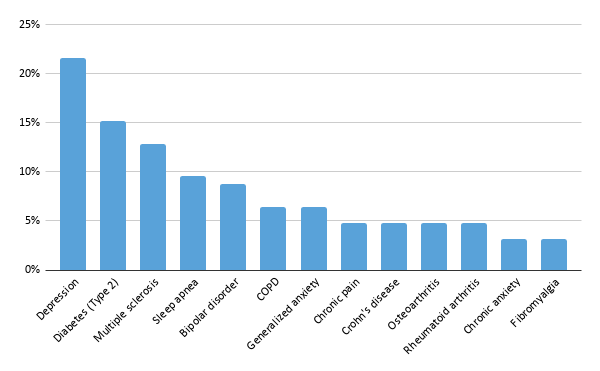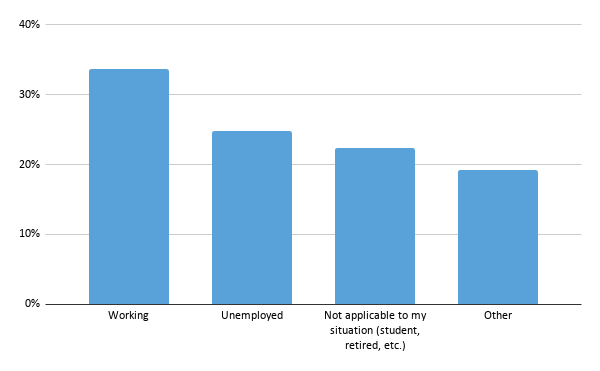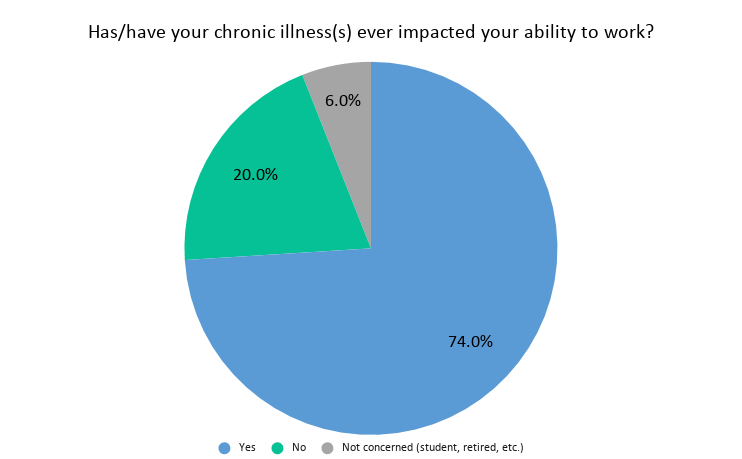Working with a chronic illness: Carenity members share their experience!
Published Feb 25, 2021 • By Courtney Johnson
Being diagnosed with a chronic illness can change a person’s life. Unlike a temporary illness such as a cold or the flu, chronic illness may never go away and can disrupt a patient’s life in many ways, encroaching on their daily life, routines, and career.
For this article, we wanted to understand how Carenity members balance working life and their health condition. 856 members shared their experiences with us via a survey!
How has chronic illness impacted Carenity members’ ability to work? What kind of accommodations have they had to make to continue working? What advice do they have?
We share it all with you in our article below!

856 Carenity members responded to our survey
We conducted a survey from February 10th to 22nd, 2021 in which 856 Carenity members in the US, the UK and France participated. We asked them questions about their life and working with a chronic health condition.
Respondents were mostly women (77%) with an average age of 54 years old.
They most often had the following chronic conditions:

In the US, the majority of respondents have depression (22%), type 2 diabetes (15%), multiple sclerosis (13%), sleep apnea (10%), or bipolar disorder (9%).
Many Carenity members with chronic illnesses are still working and were diagnosed during their career
34% percent of our members are currently working despite their chronic condition, with 22% working full time and 11% part time.

More than half of respondents (67%) were diagnosed at a time when they were working and had to process their diagnosis while also concentrating on their career.
While many of our members mentioned feeling relieved that they could finally put a name to their symptoms, many others expressed feeling shock, frustration, and even fear for their future at the moment of diagnosis:
![]()
“I couldn't believe that I was 'on the scrap heap'. My consultant said that I would never work a full shift again.”
- A 64 year old male living with type 2 diabetes, sleep apnea, ankylosing spondylitis and osteoarthritis in the UK
“I was a little concerned as to how it would affect my job. I worked in a childcare setting. Within 4 months of my diagnosis l was told l was being let go. That was in 2002 and l have had no further significant employment.”
- A 62 year old female living with rheumatoid arthritis in the UK
![]()
“I was relieved! I was so excited for answers. But at the same time I was scared with all these questions running through my head: How am I gonna deal with this? Will I ever not be in pain? How will this affect my life? How will this affect my family's life?”
- A 21 year old female living with mastocytosis and interstitial cystitis in the US
“I was shocked. I had worked like a bull my whole life with no meds, no blood pressure problems, and then I got kicked in the face with diabetes.”
- A 65 year old male living with type 2 diabetes in the US
“I was very upset. I had herniated a disc in my back at the hospital where I worked as a pharmacist and could not function for quite some time.”
- A 69 year old female living with chronic pain in the US
![]()
“I continued to work because I didn’t want the disease to take over my professional life… Unfortunately I pushed myself too hard and I even put myself in danger.”
- A 36 year old female living with Crohn’s disease and psoriatic arthritis in France
“It was like watching the total collapse of all my personal and professional goals.”
- A 39 year old male living with lupus in France
Some chronic patients hesitate on whether or not to inform their coworkers or employer about their chronic condition
Overall, 55% of respondents across all three countries made the choice to inform their employer or coworkers about their diagnosis, for the following reasons:
- They felt that they should know / For transparency
- They felt comfortable / Had a strong friendship with coworkers
- It could have a possible impact on their work or their coworkers
- They needed time off or accommodations
- They were obliged to legally
- They were not ashamed / Didn’t feel the need to hide it
In the US, however, more respondents chose not to disclose their condition at work than those that did (42% vs. 36%, respectively).
For those who decided not to disclose, they mentioned the following reasons:
- Fear of judgement
- Fear of losing their job / that it would affect their employability
- Fear of not being believed
- Embarrassment or shame
- For privacy reasons
- Because of possible bullying or hazing in the workplace
For almost 75% of respondents, their chronic illness has impacted their ability to work
Often the symptoms caused by chronic illness can impact a person’s mental or physical health to the point where it affects their ability to work.
This was the case for almost three quarters of our respondents.

Members mentioned experiencing physical pain and limitations, difficulty focusing, lack of energy, negative impact on their mental health (especially anxiety and depression), to the point where they had to or were forced to take time off work.
Despite this, only 30% of US respondents have had to make accommodations to be able to continue working. For those who have made accommodations, they have implemented the following actions:
- Changed or stopped work-related travel
- Changed roles or even career path
- Started to work freelance or as a temp to be able to control workload/amount of work taken on
- Requested special equipment, materials, or software and/or made changes to the workspace
- Adapted or changed work schedule
- Switched to part-time
- Receive help or additional support from coworkers
What advice do members have to share about how to balance chronic illness and a professional career?
We asked members to share any advice or tips they had on how to manage both their chronic illness and an active career. Here’s what they said:
“Accept that you have up and down days and be kind to yourself in allowing enough time to recover from any condition rather than risk recurrence/ongoing issues as a result. Go to bed earlier, get fresh air, keep as active as possible to keep the mood upbeat. Don't dwell on what you can't do, focus on what you can, remember all things must pass and tomorrow is another day.”
- A 62 year old female living with lung cancer
“Ensure that you have purposeful "downtime". I find yoga, light exercise and meditation very helpful. It's also OK to have a day off from everything sometimes. Be kind to yourself, but do as much as you are able to.”
- A 40 year old female living with MS
![]()
“Never give up! And remember it's okay to sit down and say "not today," you don't have to force yourself. You're strong! You don't have to let the chronic illness win!”
- A 21 year old female living with mastocytosis and interstitial cystitis
“Be honest with your employer, most of the time they will work with you.”
- A 60 year old female living with Crohn’s disease
![]()
“A chronic illness shouldn’t be considered a curse. Support from family and friends is very important. Taking time out for small moments of pleasure (social, food, sports, family, etc.) helps to maintain a psychological balance, which should not be neglected in the short and long term.”
- A 39 year old man living with lupus
“Talk to your doctor, get help from others, take a health supplement, and take care of yourself. The illness is not your fault.”
- A 53 year old woman living with bipolar disorder and IBS
Was this article helpful to you? Do you have any advice to share?
Share your thoughts and questions with the community in the comments below!
Take care!
Data taken from a Carenity survey conducted from February 10-22, 2021 on the US, UK, and French Carenity Platforms.
8 comments
You will also like

Spoon theory: What is it and how can it help people living with chronic illness?
Apr 13, 2022 • 7 comments

What is the psychological impact of chronic pain? Carenity members share their experience!
May 27, 2021 • 8 comments

 Facebook
Facebook Twitter
Twitter




